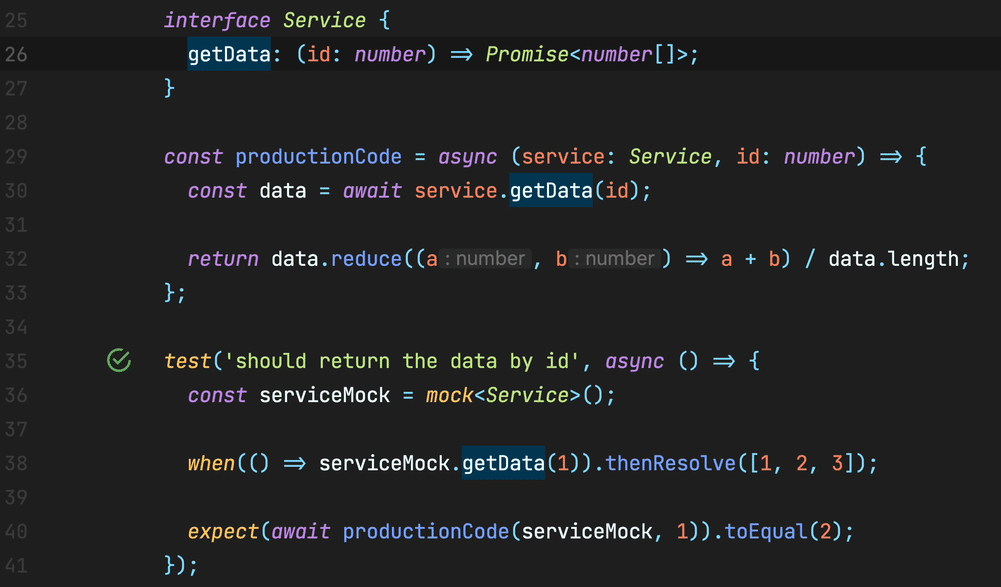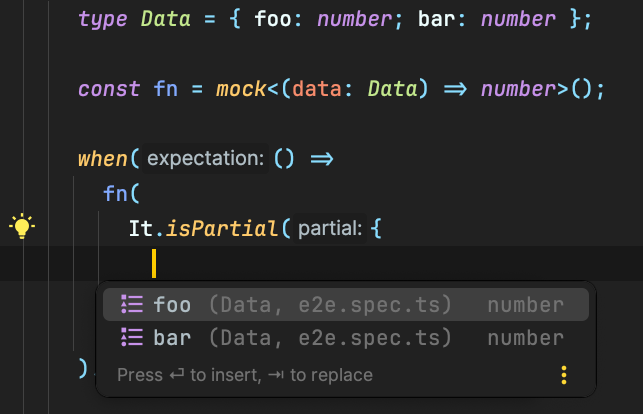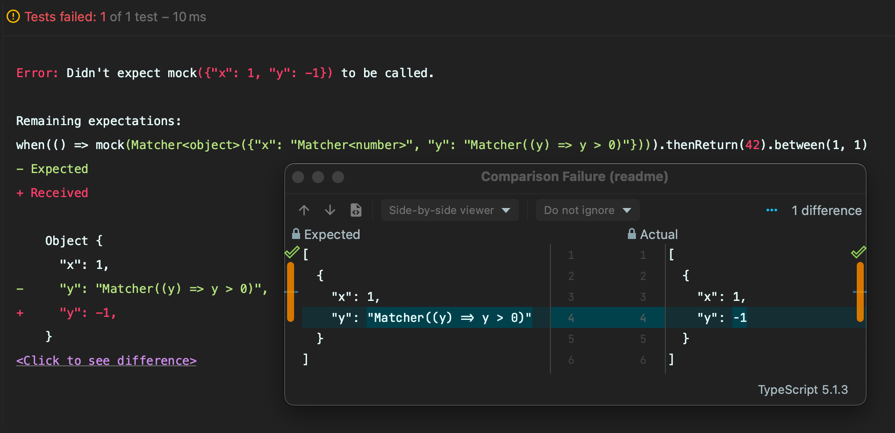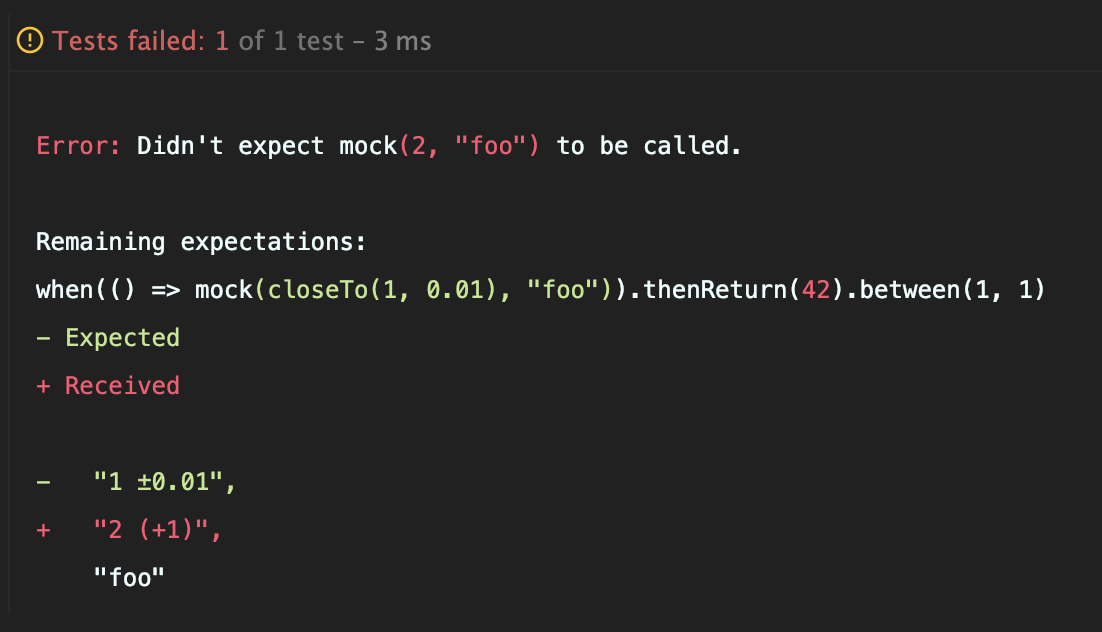import { mock, when } from 'strong-mock';
interface Foo {
bar: (x: number) => string;
}
const foo = mock<Foo>();
when(() => foo.bar(23)).thenReturn('I am strong!');
console.log(foo.bar(23)); // 'I am strong!'Table of Contents
- Features
- Installation
- API
- Mock options
- FAQ
- Why do I have to set all expectations first?
- Why do I have to set a return value even if it's
undefined? - Why do I get a
Didn't expect mock to be callederror? - Can I partially mock a concrete implementation?
- How do I set expectations on setters?
- How do I provide a function for the mock to call?
- Can I spread or enumerate a mock?
- Why does
typeof mock()returnfunction? - How can I ignore
undefinedkeys when setting expectations on objects? - How can I verify order of calls?
The mocks will share the same types as your production code, and you can safely refactor in an IDE knowing that all usages will be updated.
You can use matchers to partially match values, or create complex expectations, while still maintaining type safety.
Failed expectations will print a visual diff, and even integrate with the IDE.
import { mock, when } from 'strong-mock';
const fn = mock<(pos: { x: number; y: number }) => boolean>();
when(() =>
fn(
It.containsObject({
x: It.isNumber(),
y: It.matches<number>((y) => y > 0)
})
)
).thenReturn(true);
fn({ x: 1, y: -1 });import { mock, when } from 'strong-mock';
const fn = mock<(id: number) => Promise<string>>();
when(() => fn(42)).thenResolve('foo');
when(() => fn(-1)).thenReject('oops');
console.log(await fn(42)); // foo
try {
await fn(-1);
} catch (e) {
console.log(e.message); // oops
}npm i -D strong-mockyarn add -D strong-mockpnpm add -D strong-mockPass in the type or interface to the generic argument of mock:
interface Foo {
bar: (x: number) => string;
baz: number;
}
const foo = mock<Foo>();
when(() => foo.bar(23)).thenReturn('awesome');
when(() => foo.baz).thenReturn(100);
console.log(foo.bar(23)); // 'awesome'
console.log(foo.baz); // 100You can also mock function types:
type Fn = (x: number) => number;
const fn = mock<Fn>();
when(() => fn(1)).thenReturn(2);
console.log(fn(1)); // 2Expectations are set by calling the mock inside a when callback and setting a return value.
when(() => foo.bar(23)).thenReturn('awesome');You can set as many expectations as you want by calling when multiple times. If you have multiple expectations with the same arguments they will be consumed in the order they were created.
when(() => foo.bar(23)).thenReturn('awesome');
when(() => foo.bar(23)).thenReturn('even more awesome');
console.log(foo.bar(23)); // awesome
console.log(foo.bar(23)); // even more awesomeSometimes you're not interested in specifying all the arguments in an expectation. Maybe they've been covered in another test, maybe they're hard to specify e.g. callbacks, or maybe you want to match just a property from an argument.
const fn = mock<
(x: number, data: { values: number[]; labels: string[] }) => string
>();
when(() => fn(
It.isAny(),
It.containsObject({ values: [1, 2, 3] })
)).thenReturn('matched!');
console.log(fn(
123,
{ values: [1, 2, 3], labels: ['a', 'b', 'c'] })
); // 'matched!'You can mix matchers with concrete arguments:
when(() => fn(42, It.isPlainObject())).thenReturn('matched');Available matchers:
deepEquals- the default, uses deep equality,is- usesObject.isfor comparison,isAny- matches anything,isNumber- matches any number,isString- matches any string, can search for substrings and patterns,isArray- matches any array, can search for subsets,isPlainObject- matches any plain object,containsObject- recursively matches a subset of an object,willCapture- matches anything and stores the received value,matches- build your own matcher.
The following table illustrates the differences between the equality matchers:
| expected | actual | It.is |
It.deepEquals |
It.deepEquals({ strict: false }) |
|---|---|---|---|---|
"foo" |
"foo" |
equal | equal | equal |
{ foo: "bar" } |
{ foo: "bar" } |
not equal | equal | equal |
{ } |
{ foo: undefined } |
not equal | not equal | equal |
new (class {})() |
new (class {})() |
not equal | not equal | equal |
Some matchers, like containsObject and isArray support nesting matchers:
It.containsObject({
foo: It.isString()
})
It.isArray([
It.containsObject({
foo: It.isString(/foo/)
})
])It.willCapture will match any value and store it, so you can access it outside an expectation. This could be useful to capture a callback and then test it separately.
type Cb = (value: number) => number;
const fn = mock<(cb: Cb) => number>();
const matcher = It.willCapture<Cb>();
when(() => fn(matcher)).thenReturn(42);
console.log(fn(23, (x) => x + 1)); // 42
console.log(matcher.value?.(3)); // 4With It.matches you can create arbitrarily complex and type safe matchers:
const fn = mock<(x: number, y: string) => string>();
when(() => fn(
It.matches(x => x > 0),
It.matches(y => y.startsWith('foo'))
)).thenReturn('matched');The types are automatically inferred, but you can also specify them explicitly through the generic parameter, which is useful if you want to create reusable matchers:
const startsWith = (expected: string) => It.matches<string>(
actual => actual.startsWith(expected)
);
when(() => fn(42, startsWith('foo'))).thenReturn('matched');
fn(42, 'foobar') // 'matched'You can also customize how the matcher is printed in error messages, and how the diff is printed:
const closeTo = (expected: number, precision = 0.01) => It.matches<number>(
actual => Math.abs(expected - actual) <= precision,
{
toString: () => `closeTo(${expected}, ${precision})`,
getDiff: (actual) => {
const diff = Math.abs(expected - actual);
const sign = diff < 0 ? '-' : '+';
return {
actual: `${actual} (${sign}${diff})`,
expected: `${expected} ±${precision}`,
};
}
}
);
when(() => fn(closeTo(1), 'foo')).thenReturn('matched');
fn(2, 'foo');By default, each call is expected to be made only once. You can expect a call to be made multiple times by using the invocation count helpers between, atLeast, times, anyTimes etc.:
const fn = mock<(x: number) => number>();
when(() => fn(1)).thenReturn(1).between(2, 3);
console.log(fn(1)); // 1
console.log(fn(1)); // 1
console.log(fn(1)); // 1
console.log(fn(1)); // throws because the expectation is finishedYou'll notice there is no never() helper - if you expect a call to not be made simply don't set an expectation on it and the mock will throw if the call happens.
If you're mocking something that returns a promise then you'll be able to use the thenResolve promise helper to set the return value.
type Fn = (x: number) => Promise<number>;
const fn = mock<Fn>();
when(() => fn(1)).thenResolve(42);
console.log(await fn(1)); // 42You can also use thenReturn with a Promise value:
when(() => fn(1)).thenReturn(Promise.resolve(42));Use thenThrow or thenReject to throw an Error instance. You can customize the error message, or even pass a derived class.
type Fn = (x: number) => void;
type FnWithPromise = (x: number) => Promise<void>;
class MyError extends Error {}
const fn = mock<Fn>();
const fnWithPromise = mock<FnWithPromise>();
// All of these will throw an Error instance.
when(() => fn(1)).thenThrow();
when(() => fn(2)).thenThrow(MyError);
when(() => fnWithPromise(1)).thenReject('oops');Calling verify(myMock) will make sure that all expectations set on the mock have been met, and that no additional calls have been made.
const fn = mock<(x: number) => number>();
when(() => fn(1)).thenReturn(1).between(2, 10);
verify(fn); // throws UnmetExpectationsIt will also throw if any unexpected calls happened that were maybe caught in the code under test.
const fn = mock<() => void>();
try {
fn(); // throws because the call is unexpected
} catch(e) {
// your code might transition to an error state here
}
verify(fn); // throws UnexpectedCallsIt is recommended that you call verify() on your mocks at the end of every test. This will make sure you don't have any unused expectations in your tests and that your code did not silently catch any of the errors that are thrown when an unexpected call happens. You can use verifyAll() to check all existing mocks.
afterEach(() => {
verifyAll();
});You can remove all expectations from a mock by using the reset() method:
const fn = mock<(x: number) => number>();
when(() => fn(1)).thenReturn(1);
reset(fn);
fn(1); // throwsIf you create common mocks that are shared by multiple tests you should reset them before each test. You can use resetAll() to reset all existing mocks.
beforeEach(() => {
resetAll();
});The following options can be set per mock, or globally with setDefaults.
import { mock, when, setDefaults } from 'strong-mock';
setDefaults({
exactParams: true
});
// Uses the new default.
const superStrictMock = mock<() => void>();
// Overrides the default.
const strictMock = mock<() => void>({ exactParams: false });You can control what happens whenever an unexpected property is accessed, or an unexpected call is made.
import { mock, when, UnexpectedProperty } from 'strong-mock';
type Foo = {
bar: (value: number) => number;
}
// This is the default.
const callsThrow = mock<Foo>({
unexpectedProperty: UnexpectedProperty.CALL_THROW
});
// Accessing properties with no expectations is fine.
callsThrow.bar;
// Throws "Didn't expect bar(42) to be called".
callsThrow.bar(42);
const propertiesThrow = mock<Foo>({
unexpectedProperty: UnexpectedProperty.THROW
});
// Throws "Didn't expect property bar to be accessed".
propertiesThrow.bar;
// Throws "Didn't expect property bar to be accessed".
propertiesThrow.bar(42);By default, function/method expectations will allow more arguments to be received than expected. Since the expectations are type safe, the TypeScript compiler will never allow expecting less arguments than required. Unspecified optional arguments will be considered ignored, as if they've been replaced with matchers.
import { mock } from 'strong-mock';
const fn = mock<(value?: number) => number>();
when(() => fn()).thenReturn(42).twice();
// Since the expectation doesn't expect any arguments,
// both of the following are fine
console.log(fn()); // 42
console.log(fn(1)); // 42If you're not using TypeScript, or you want to be super strict, you can set exactParams: true.
import { mock } from 'strong-mock';
const fn = mock<(optionalValue?: number) => number>({
exactParams: true
});
when(() => fn()).thenReturn(42).twice();
console.log(fn()); // 42
console.log(fn(1)); // throwsYou can configure the matcher that will be used in expectations with concrete values e.g. 42 or { foo: "bar" }. This matcher can always be overwritten inside an expectation with another matcher.
import { mock, when, It } from 'strong-mock';
// Use strict equality instead of deep equality.
const fn = mock<(x: number[], y: string) => boolean>({
concreteMatcher: It.is
});
when(() => fn([1, 2, 3], 'foo')).thenReturn(true);
fn([1, 2, 3], 'foo'); // throws because different array instances
const arr = [1, 2, 3];
// The matcher will only apply to non-matcher arguments.
when(() => fn(arr, It.isString())).thenReturn(true);
console.log(fn(arr, 'any string')); // trueThis library is different from other mocking/spying libraries you might have used before such as sinon or jest. Whereas those libraries are focused on recording calls to the mocks and always returning something, strong-mock requires you to set your expectations upfront. If a call happens that is not expected the mock will throw an error.
This design decision has a few reasons behind it. First, it forces you to be aware of what your code needs from its dependencies. Spying libraries encourage checking those needs at the end of the test after the code has already called the mocks. This can lead to tests missing dependency calls that just happen to not throw any error at runtime with the dummy values that the spies return.
Secondly, it will highlight potential design problems such as violations of the SOLID principles. If you find yourself duplicating expectations between tests and passing dummy values to them because your test is not concerned with them, then you might want to look into splitting the code to only depend on things it really needs.
To make side effects explicit and to prevent future refactoring headaches. If you had just when(() => fn()), and you later changed fn() to return a number, then your expectation would become incorrect and the compiler couldn't check that for you.
This error happens when your code under test calls a mock that didn't have a matching expectation. It could be that the arguments received didn't match the ones set in the expectation (see matchers), or the call was made more than the allowed number of times (see invocation count expectations).
In rare cases, the code under test may try to inspect the mock by accessing special properties on it. For instance, wrapping a mock in Promise.resolve() will try to access a .then property on it. strong-mock returns stub values for most of these, but if you find another one feel free to open an issue with a minimal reproduction.
Unfortunately, not all of these cases can be covered with stub values, and you may have to slightly adjust your code to work around this issue.
No, passing a concrete implementation to mock() will be the same as passing a type: all properties will be mocked, and you have to set expectations on the ones that will be accessed.
You currently can't do that. Please use a normal method instead e.g. setFoo() vs set foo().
There is no thenCall() method because it can't be safely typed - the type for thenReturn() is inferred from the return type in when, meaning that the required type would be the return value for the function, not the function itself. However, we can leverage this by setting an expectation on the function property instead:
interface Foo {
bar: (x: number) => string;
}
const foo = mock<Foo>();
when(() => foo.bar).thenReturn(x => `called ${x}`);
console.log(foo.bar(23)); // 'called 23'The function in thenReturn() will be type checked against the actual interface, so you can make sure you're passing in an implementation that makes sense. Moreover, refactoring the interface will also refactor the expectation (in a capable IDE).
Yes, and you will only get the properties that have expectations on them.
const foo = mock<{ bar: number; baz: number }>();
when(() => foo.bar).thenReturn(42);
console.log(Object.keys(foo)); // ['bar']
const foo2 = { ...foo };
console.log(foo2.bar); // 42
console.log(foo2.baz); // undefinedAll mocks and methods on them are functions in order to intercept function calls.
Use the It.deepEquals matcher explicitly inside when and pass { strict: false }:
const fn = mock<(x: { foo: string, bar?: string }) => boolean>();
when(() => fn(
It.deepEquals({ foo: "bar" }, { strict: false }))
).thenReturn(true);
fn({ foo: "bar", baz: undefined }) === trueYou can set this behavior to be the default by configuring the concrete matcher.
setDefaults({
concreteMatcher: (expected) => It.deepEquals(expected, { strict: false })
});when() expectations can be satisfied in any order. If your code under test depends on a specific order of execution, consider redesigning it to remove the coupling before the different calls.





